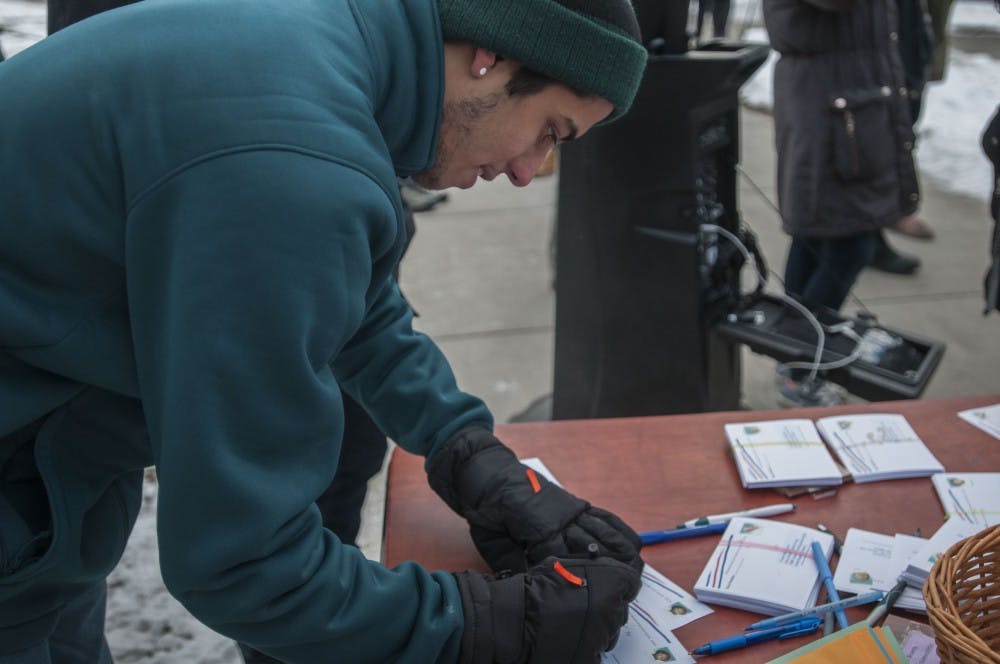At the March for Survivors and Change at MSU on Jan. 26, hundreds stamped and addressed postcards, which were scattered across a card table, intended for those at the march to write to enablers of sexual assault and abuse.
More than 500 people, including MSU students, staff, faculty and other members of the community, attended the march in order to stand in solidarity with the survivors of ex-MSU and USA Gymnastics doctor Larry Nassar’s sexual abuse.
While the protesters were gathered around the Rock on Farm Lane, they were encouraged to write messages to members of the MSU administration and others who have enabled Nassar to sexually abuse women and girls for 20 years.
Trustee Brian Breslin, the Board of Trustees, John and Kathryn Geddert, trustee Mitch Lyons and trustee Joel Ferguson were some of the names that appeared on the letters.
According to the “Postcards to Enablers” website, the letters, which were initially at the Women’s March Michigan, are meant to "speak to the anger, frustration, and sadness that many are experiencing because of the actions by MSU employees, MSU's leaders, and others” while also reflecting the sentiment that change is possible.
The website includes a gallery of some of the letters that were left on the table to be mailed out to their respective addresses.
“I was taken back with your comments in support of former President Simon,” one letter addressed to trustee Joel Ferguson read. “I couldn’t believe that someone in your position could speak so openly, carelessly, and irresponsibly. Your insensitivity was a complete embarrassment on our university. I hope you feel shameful. Us students are ashamed.”
Karen Hoene was a volunteer at the postcard tent during the Women’s March in Lansing on Jan. 21. There, she encouraged attendees to fill out postcards to send to a list of addresses.
There were three different postcard designs, and it wasn’t long before Hoene began noticing how many attendees were intrigued with the postcards that pictured, overlaid with a Martin Luther King Jr. quote.
“It just generated so much conversation and I found that so many people were just really, really interested in taking these postcards and sending them off,” she said.
Although sending these postcards to Nassar enablers was not the initial intention, Hoene soon realized that many of the people who approached the tent had some sort of link to the Nassar case.
“By sitting at that table and talking to people, it was amazing to me how — and horrifying, really — how many people that came up to me had some sort of connection,” she said.
Leading up to the March for Survivors and Change at MSU after former MSU president Lou Anna K. Simon’s resignation, Hoene and one of her friends had the idea to supply the same postcards from the Women’s March to the student event.
“We decided to print address labels of all of the people that we could think of that people might want to address their comments to,” she said.
Hoene said there were roughly 475 letters filled out by attendees of the March for Survivors and Change at MSU.
“I believe that the university is represented by the students and the community, not by the leadership, in this case,” Hoene said. “I think that how our university responds to this (protests and direct letters) is going to be absolutely crucial in what happens next.”
Hoene said she and other organizers hope to continue utilizing postcards like these to not only give students a voice and an opportunity to express their anger and thoughts, but to also thank survivors who came forward to tell their stories.
“I know that people email and make phone calls, but as something so visual, like a postcard arriving in the mail, I just think that it’s really, really powerful and I think it speaks volumes,” she said.
Support student media!
Please consider donating to The State News and help fund the future of journalism.
Discussion
Share and discuss “Postcards to enablers reflect anger, frustration, desire for change” on social media.







